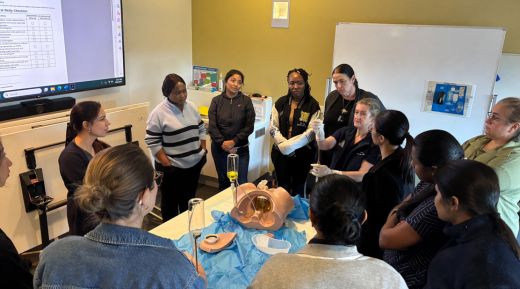



To receive important alerts and updates from Gold Coast Primary Health Network, please submit the form below.
"*" indicates required fields

To receive important alerts and updates from Gold Coast Primary Health Network, please submit the form below.

An innovative program is helping aged care home staff better assess and manage various medical issues, reducing after-hours presentations to Gold Coast hospital emergency departments.
Commissioned by the Gold Coast Primary Health Network and delivered by a specialist Gold Coast Health team, the Residential Aged Care Home (RACH) After Hours Project focuses on workforce education and onsite clinical training in areas such as catheterisation, management plans, IT platforms, palliative care and dementia behaviours.
The aim is to upskill aged care staff, especially during nights, weekends and public holidays, when support is minimal and residents’ GPs are typically unavailable.
“Our role is to bring the resources to the homes, so the staff can make informed decisions, and more residents can remain in familiar surroundings,” says RACH After Hours Project Lead Kelly Ellis.
“The aged care homes already have most of the tools and the staff have their own competencies, but we’re providing more clear-cut tools from the hospital side of things.
“Many presentations occur after hours when the nurses and others on-site have minimal in-house support.
“There’s often a higher number of casual or junior staff on shift, and they might not always know what to do, who the on-call doctor is, or what the escalation point should be; this program aims to change all that,” she says.
Initially funded for 12 months in 2023, the program has been extended thanks to strong engagement and promising early results.
And to make it sustainable, Gold Coast Health and GCPHN have co-designed a ‘train the trainer’ model, empowering senior staff and educators in select facilities to deliver training to their colleagues.
A key part of the program is practical training, and Kelly says the recent addition of hands-on instruction for catheter insertion has been particularly well received.
“We have two mannequins, male and female, cut off at the waist, so staff can practise catheterisation through the genitalia,” she says.
“It’s as close to lifelike simulation as possible without involving a real patient.”
In addition to technical training, Kelly has developed a comprehensive workbook outlining resources, procedures and escalation points for staff to follow in after-hours scenarios.
But she says the ultimate success of the program depends on strong relationships.
The team works closely with the PHN, RACHs and services such as the Gold Coast Health RACF Acute Support Service (RASS), which provides a rapid response as an alternative to the ED for RACH residents.
“It’s partnerships that count; we can’t work in silos,” Kelly says.
“This only works with the support of the RACH staff and as much as they want to partner.”
She acknowledges the intense daily pressures faced by aged care workers and says the program is designed to support, not add burden.
“We’re all busy in our roles and aged care staff have huge responsibilities, so we’re mindful of that in how we deliver the education and engage with the facilities.
“But the engagement is there, and we’re looking forward to developing it more because, like everything in patient care, it can always be better.”
So we can provide you with the most accurate information,
please tell us a little more about yourself

